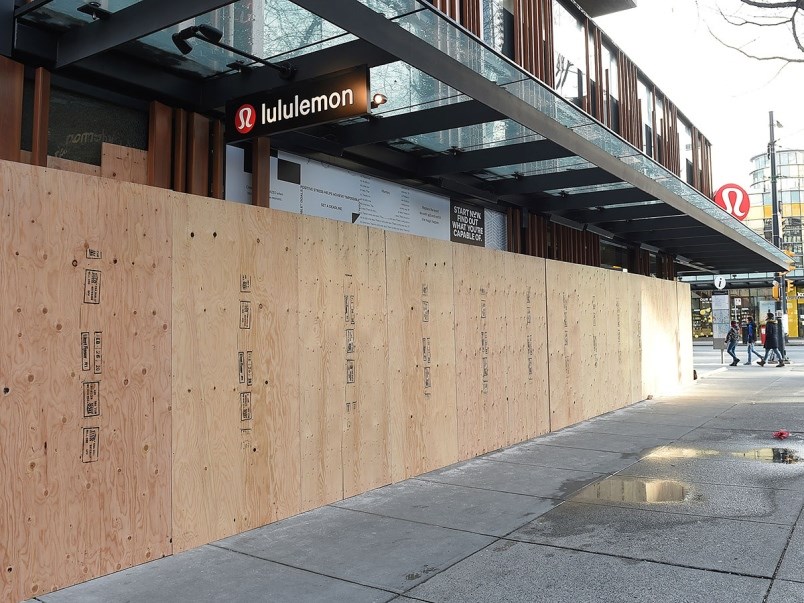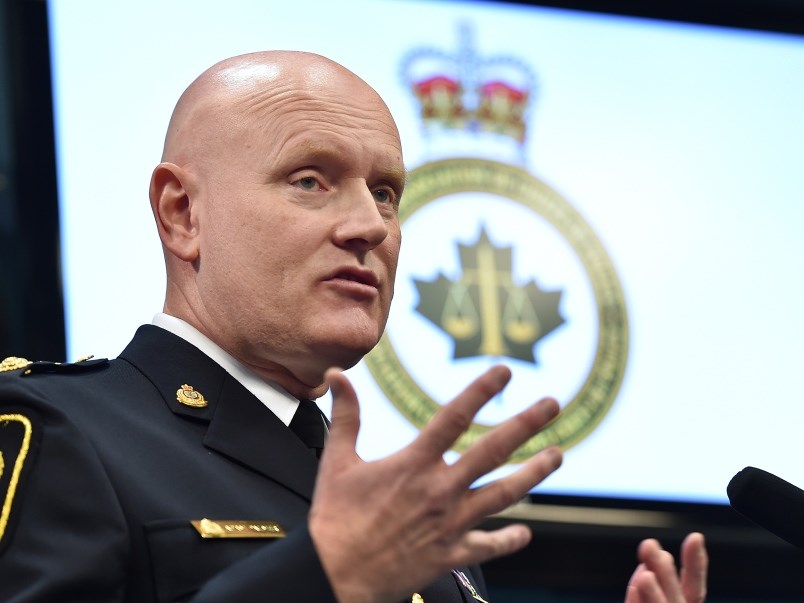Vancouver Police Chief Adam Palmer never imagined he would one day lead his department through a pandemic and watch as his officers fell ill to a coronavirus.
But that day has come and at least one officer has contracted COVID-19 while an undisclosed number of others are presumed to be infected with the virus.
“We have a number of officers like that,” Palmer said of the presumptive cases at the department. “As you can imagine, when someone comes down with COVID-19, we have a doctor come in and do an assessment and look at all the different tentacles: an analysis of people and their team, where were they working, who did they have contact with, all of that kind of stuff.”
The outbreak’s physical and mental toll on Palmer’s officers was among the topics discussed during a telephone interview Friday focused on the challenges of policing Vancouver during a pandemic.
The chief talked about new protocols and equipment in place for officers, how some types of crime have decreased and why officers are not being tested for COVID-19 after finishing a shift.
The obvious inability to employ physical distancing measures during arrests and how the 2010 Winter Olympics helped the department respond to the pandemic were other topics.
The following is a condensed and edited version of the interview, which was conducted by telephone on the same day that Provincial Health Officer Dr. Bonnie Henry announced COVID-19 cases reached 1,174 in B.C.
That number climbed to 1,203 on Saturday.
How’s it going out there?
Well, it’s really strange times in history, nothing that I’ve ever experienced or any of us have experienced in our lifetime. Not just in our careers as police officers, but really in our whole adult lives. Even generations before us, nobody’s really seen this in Canada. It really wasn’t in our business plan to have a pandemic coming down.
Is crime going up or down?
Crime is down. Violent crime is down 18 per cent [from the first two weeks in March to last two weeks in March]. So pretty significant. Property crime is also down by 18 per cent, just by coincidence. We obviously get more property crime than we do violent crime. That’s a constant in any city. However, the one crime that is up is commercial break and enters [particularly in downtown, Kitsilano and Fairview].
 Commercial property crime has increased in some areas of Vancouver as a result of store closures during the pandemic. Photo Dan Toulgoet
Commercial property crime has increased in some areas of Vancouver as a result of store closures during the pandemic. Photo Dan ToulgoetI’m curious if response times to calls have improved because the roads are less congested these days.
I don’t have that number handy, but I would suspect they probably have. But that’s just off the top of my head. I don’t have any data in front of me on that, but probably. Traffic is down, the number of calls we’re shedding [via Internet and telephone reporting] is helping, so we’re not going to as many calls in person. So I think that’s a logical conclusion.
What’s the biggest challenge of policing during a pandemic?
Many of our officers have kids and some of the younger officers have babies and toddlers. So we have parents and grandparents worried about transmission of COVID-19. Officers don’t have the ability — like some other professions —to stay at home, or shelter in place. There are a few that work from home, but for the most part it’s not a spectator sport and officers are out there on the frontlines responding to calls. In our job, the reality is that you do sometimes have to get in close proximity and you do have to touch people — and arrest people and sometimes fight with people. And sometimes there’s blood and other bodily fluids. So there’s even more heightened levels of concern with COVID-19 in the background all the time.
How is the officer doing who contracted COVID-19?
I’ve spoken with him. He’s a younger officer, he’s in good spirits and has a really positive attitude considering what he’s going through. He’s at home isolating, he’s not in hospital. He’s getting better and getting medical advice. And we’re doing everything we can to help him through it. It’s tough on everybody, but he’ll get better. He’s actually looking forward to getting better and testing negative and getting medical clearance to come back to work, which will inevitably happen.
You mentioned you have more officers off sick than you normally would. How many and why?
I don’t have the exact number. We do have people who are presumptive COVID-19. Others who are more mild [in their symptoms]. All those people are being monitored and looked after. We definitely have more people off sick right now because we just don’t want to take any chances. We’re erring on the side of caution. Before, we’ve all come to work with a bit of the sniffles and that kind of thing, but now that’s not the case. So we’re telling people if you’ve got a cough, sore throat, sniffles, running nose — whatever it is — to stay home and self-isolate.
Are officers able to be tested for COVID-19 after finishing a shift?
No, that’s not in place. That’s one of the things that we’ve been working on. Testing for first responders is a concern. That’s something we’ve been bringing up locally — myself and Fire Chief Darrell Reid. We’ve also been working with other chiefs in British Columbia through the provincial government, and we’ve also raised it to the federal solicitor-general’s level. We do need that, we do need testing for frontline personnel. Right now the focus is on health care workers, which I totally respect and understand — and health care workers should have front-of-the-line testing without a doubt — but also police, fire and ambulance are out there every day as well, and sometimes in some pretty sketchy situations.
So what’s the process now if an officer is showing symptoms?
I’m sure you’re familiar with the 811 [provincial health information and phone line] system. So we have another system. Think of it as a front-of-the-line 811 system for police and first responders. Our officers and civilian members can phone up this service and get connected right away. There’s no delay for them or their families. The families are a concern when the officer is coming home after being at work. They can get medical advice right away from a doctor. As far as actual testing, it’s a case-by-case basis. So there’s no system where everybody’s continually being run through tests. Something like that doesn’t exist right now. But when we do have people come up in situations where they’re getting sick or they are presumptive COVID-19, then we will get those people tested.”
Has the department ever had a pandemic plan?
We had a pandemic plan in place right from the start. We were fortunate that coming off the 2010 Olympics, we had lots of good planning in place for every possible scenario you can imagine. We did have a good pandemic plan, but it was 10 years old, and nothing really happened in that regard since. So we had to blow the dust off that. But quite frankly, you can have the best pandemic plan on the planet, but a lot of this stuff — like a lot of other agencies — we’re trying to figure this out on the fly and implement best practices for our agency and keep officers safe, and keep the public safe. So a lot of things we’re adjusting to as we go.
Any additional equipment being provided to officers?
We’ve outfitted the officers on the frontlines with really good personal protective equipment. A lot of things they would have had before, like Isagel hand sanitizer and gloves. But they’ve got glasses now to protect their eyes and wipes to wipe down surfaces and surgical-type masks. They’ve always had respirators because it was part of their kit for things like a riot situation, or having to deploy tear gas or something. They’ve got pretty good equipment, but the psychological impact is huge, and we do have people still pulling people off bridges and breaking up fights and arresting people for assault and all that, and they do have to touch people. So decontamination and keeping them healthy physically and their mental well-being is right near the top of my priorities right now.
How does decontamination work? Take me through what happens after an officer finishes a shift.
We have a lot more cleaning going on, with extra cleaners in the building and everything’s being wiped down all the time. The vehicles are getting a deep cleaning every day. The officers are given wipes and stuff, so when they leave their vehicles at the end of shift or coming on shift, they’re wiping it down —like the steering wheel, radio, things you would touch the most. Everybody’s very conscious of that. Nothing in this world is 100 per cent, but we’re going to do everything we can to mitigate that risk [of contracting the virus].
Any final thoughts?
Hit me up after all this is over for lessons learned because I’m sure I’ll have a few for you.
[email protected]
@Howellings



